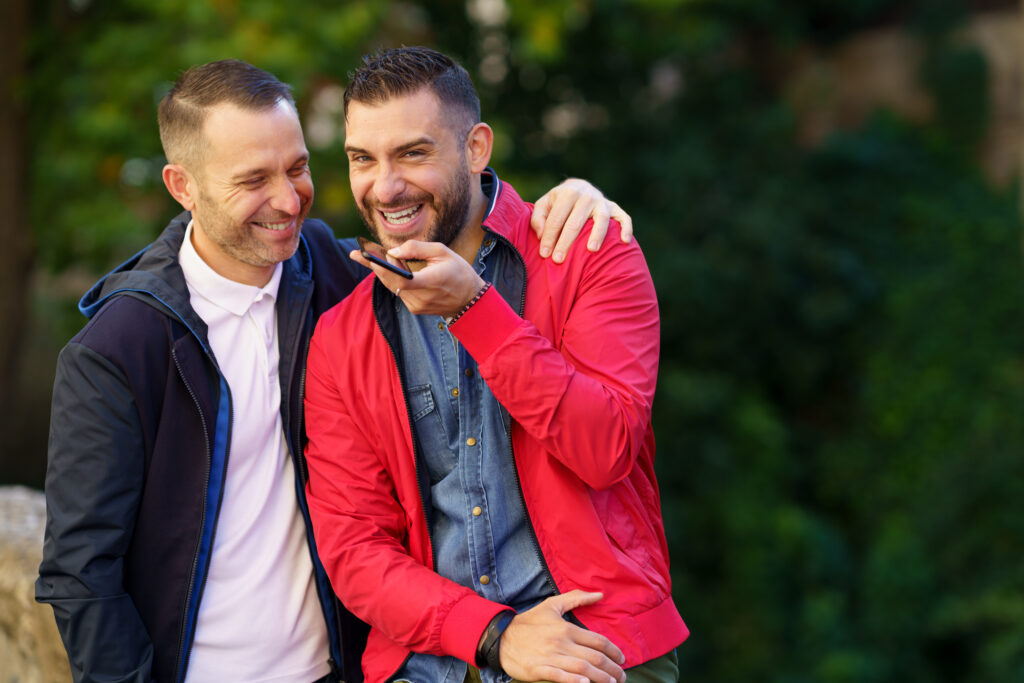Discovering infidelity can shake the foundations of any relationship, but for LGBTQ individuals in NYC, it comes with specific cultural and emotional hurdles. In this article, I’ll focus on guidance about lgbtq infidelity recovery NYC, presenting understanding and practical support to help you and your partner start the process of healing. I’ll explore effective strategies for rebuilding trust after an affair, discuss the distinct challenges LGBTQ+ couples face in New York City, and highlight the therapeutic techniques we use at Loving at Your Best to help partners heal and move forward. I’ll highlight Gottman Method Couples Therapy and how we treat LGBTQ+ relationships experiencing affairs. I’ve been working with gay couples in New York City since 1995, and I’ll share some of my experiences to help you in this challenging time.
Key Takeaways
-
- Navigating LGBTQ infidelity in NYC is like diffusing a bomb while riding a unicycle – it’s intense, balance is key, and you need a bomb squad (aka specialist therapist) by your side.
-
- Specialized therapy approaches, such as Emotionally Focused Therapy, the Gottman Method, Schema Therapy, and Cognitive Behavior Therapy, are like GPS for the rocky road to recovery—they give clear direction and ensure you don’t reach a dead end.
-
- Travis Atkinson is an expert in LGBTQ couples counseling – wise, experienced, and with the right skills to guide you through the dark forests of infidelity recovery.

The Impact of Infidelity on LGBTQ Relationships in NYC

Infidelity can create deep emotional wounds and erode trust in any relationship, but for LGBTQ couples in NYC, the stakes are even higher. The city’s vibrant atmosphere can also include judgmental influences that can exacerbate relationship issues, making recovery a complex process. Societal pressures and internalized issues often turn the aftermath of an affair into an emotional rollercoaster, leaving couples grappling with both personal and external challenges.
In NYC, LGBTQ relationships encounter unique challenges – discrimination, societal judgment, and additional mental health problems. These factors can complicate the healing process, underscoring the need for specialized support like gay couples therapy. Professional couples counseling for same sex couples serves as a lifeline for relationship issues, guiding partners in couples counseling through the turbulent journey of infidelity recovery.
Societal Pressures and Internalized Issues
Therapy sessions for LGBTQ individuals and gay and lesbian couples often resemble a deep-sea dive into one’s psyche, exploring internalized homophobia and societal pressures that complicate relationship challenges. Imagine trying to rebuild trust while dodging the sharks of discrimination and stigma — the emotional trauma of discovering an affair alone can trigger PTSD, making a recovery feel like a Herculean task even with couples therapy.
In NYC, societal judgments confront LGBTQ couples, challenging them to manage non-traditional relationship structures in a same sex relationship. Gay couples therapy strengthens resilience against these external pressures and equips couples with coping strategies for mental health and intimacy issues. It’s like having an emotional toolkit to fix the leaks in your relationship boat.
Strategies for Rebuilding Trust
Rebuilding trust after an affair is akin to reconstructing a house hit by a tornado. Open communication, setting boundaries, and seeking professional support through effective gay couples therapy are the blueprints for this reconstruction.
Establishing an environment where both partners can voice their feelings, offer apologies as appropriate, and assume responsibility is paramount. Professional couples counseling for same sex couples helps set healthy boundaries and defining clear expectations to ease the rebuilding process.
Consider the following strategies to help address and rebuild trust after an affair:
-
Understanding the Breach: Infidelity profoundly impacts the foundation of trust in any relationship. Recognizing the emotional and psychological toll on both partners is the first step in the healing process.
-
Open Communication: Honest and open communication is crucial. Regular check-ins and discussions about feelings can help rebuild a connection. Creating a safe space where both partners feel heard is essential.
-
Setting Boundaries and Expectations: Establishing clear boundaries and mutual expectations can prevent future breaches of trust. Couples should agree on what constitutes infidelity and discuss how to avoid past mistakes.
-
Professional Support: Couples therapy can provide structured support for navigating complex emotions and rebuilding trust. Loving at Your Best Marriage and Couples Counseling offers specialized services for LGBTQ+ couples.
Specialized Therapy Approaches for LGBTQ Infidelity Recovery

Different couples therapy approaches offer varying degrees of effectiveness for infidelity recovery for same sex couples. Specialized methods like Emotionally Focused Therapy (EFT), the Gottman Method, and Schema Therapy for Couples offer tailored support for LGBTQ couples seeking couples therapy. These approaches focus on emotional understanding, secure attachment, and practical communication skills, making them invaluable tools in the recovery arsenal,.
Therapeutic Techniques for LGBTQ+ Couples to Heal and Move Forward from Infidelity
-
Emotionally Focused Therapy (EFT): EFT helps couples understand and express their emotions constructively. Identifying negative patterns and replacing them with positive interactions is a key component.
-
Cognitive Behavioral Therapy (CBT): CBT helps partners reframe negative thoughts and behaviors. Practical exercises and techniques improve communication and trust.
-
Schema Therapy for LGBTQ Couples: Schema therapy addresses deep-rooted patterns and beliefs. It helps LGBTQ+ couples understand and change maladaptive behaviors.
-
Mindfulness and Stress Reduction Techniques: Mindfulness practices can help couples manage stress and stay present in their healing journey. Incorporating mindfulness exercises into daily routines can be beneficial.
EFT leverages emotional understanding to foster a secure connection between partners, guiding them through the tumultuous waters of healing in mental health. On the other hand, the Gottman Method provides insights into relationship dynamics and actionable techniques to build a solid foundation for a healthier partnership, regardless of sexual orientation. These therapeutic techniques act as driving forces, steering couples toward a brighter and more secure future.
Emotionally Focused Therapy: Healing Emotional Wounds
Emotionally Focused Therapy (EFT) is like a soothing balm for the emotional wounds inflicted by infidelity. By acknowledging the emotional landscape of a relationship, EFT guides couples through healing and growth as partners face mental health challenges. Think of it as couples therapy with emotional first aid, helping partners regulate the turmoil that often follows an affair.
For LGBTQ couples, EFT focuses on:
-
- Understanding and reshaping negative emotional cycles that contribute to infidelity
-
- Techniques like reframing thoughts and articulating emotions to alter emotional responses and de-escalate conflict
-
- Transforming destructive cycles into patterns of secure attachment
-
- Strengthening the emotional bonds that hold the relationship together
The goal is to transform these destructive cycles into patterns of secure attachment, strengthening the emotional bonds that hold the relationship together while overcoming mental health concerns in New York.
The Gottman Method: Building Solid Foundations
The Gottman Method is like the architectural blueprint for a sturdy relationship. This approach provides LGBTQ couples with insights into their relationship dynamics, helping them construct a solid foundation for a healthier partnership after infidelity. It’s like having a master builder guide you through the process of rebuilding your love nest. LGBTQ couples counseling is needed for partners to be led by a couples therapist who understands the landscape of LGBTQ clients.
Research by the Gottman Institute has highlighted both similarities and differences between LGBTQ and heterosexual relationships, offering a deeper understanding of the unique challenges faced by same-sex couples. This method’s practical techniques and actionable insights are particularly beneficial for those in same sex relationships, reinforcing the resilience needed to overcome the aftermath of infidelity in a same sex relationship.
Highlight: Gottman Method Couples Therapy for LGBTQ+ Relationships
The Gottman Method, developed by Drs. John and Julie Gottman is renowned for its effectiveness in treating relationship issues, including infidelity. This approach particularly benefits LGBTQ+ couples by focusing on building strong, healthy relationships through evidence-based techniques.
-
Assessing the Relationship: The process begins with a thorough relationship assessment using the Gottman Relationship Checkup. This helps identify specific areas of concern and strengths within the relationship.
-
Building a Sound Relationship House: The Gottman Method focuses on building a “Sound Relationship House” with key components like trust and commitment. This model emphasizes creating shared meaning, managing conflict, and enhancing emotional connection.
-
Repairing and Rebuilding Trust: A critical aspect of the Gottman Method is its approach to repairing trust after an affair. Techniques such as attunement exercises help partners connect emotionally and understand each other’s needs.
-
Conflict Management: The method teaches effective conflict management strategies, helping couples navigate disagreements without escalating into harmful patterns. This is especially important in the context of infidelity recovery.
-
Creating Shared Meaning: The Gottman Method helps couples create a deeper connection and rebuild their relationship on a stronger foundation by fostering shared goals and values.
Gottman Institute Findings on LGBTQ+ Couples
Research by the Gottman Institute has highlighted both similarities and differences between LGBTQ+ and heterosexual couples. Key findings include:
-
Similarities:
-
LGBTQ+ couples face the same core issues as heterosexual couples, such as communication problems, conflicts over finances, and intimacy issues.
-
The success rate of therapy for LGBTQ+ couples is comparable to that for heterosexual couples.
-
-
Differences:
-
LGBTQ+ couples often experience additional stress due to societal stigma, discrimination, and internalized homophobia.
-
Same-sex couples tend to be more egalitarian in their relationship dynamics compared to heterosexual couples.
-
Gay and lesbian couples are more likely to demonstrate flexibility in their roles and responsibilities within the relationship.
-
At Loving at Your Best Marriage and Couples Counseling, we utilize the Gottman Method to help LGBTQ+ couples navigate the challenges of infidelity. Our therapists are trained to provide the support and tools needed to rebuild trust and create lasting, meaningful relationships.

Travis Atkinson and Loving at Your Best: Expertise in LGBTQ Couples Counseling

Meet Travis Atkinson, the seasoned clinician behind Loving at Your Best Marriage and Couples Counseling. With a Master’s in Clinical Social Work and Management from New York University, Travis has been a beacon of hope for LGBTQ couples since 1995. His extensive certifications and expertise make him the go-to therapist for those navigating the choppy waters of infidelity recovery.
Travis’s practice employs the Gottman Method, Emotionally Focused Therapy for Couples, and Schema Therapy for Couples, focusing on the unique needs of LGBTQ couples and gay couples therapy in New York. His commitment to the LGBTQ community is evident in his long-standing focus on gay couples, helping them build healthier relationships and navigate the complexities of infidelity. Think of him as the captain of your recovery ship, guiding you safely to shore through LGBTQ couples counseling.
Jon Prezant and Loving at Your Best: Expertise in LGBTQ Couples Counseling
Meet Jon Prezant, a dedicated Loving at Your Best Marriage and Couples Counseling clinician. Jon brings a wealth of knowledge and compassion to his practice, holding a Master’s degree in Social Work from Fordham University and an undergraduate degree from the University of Rochester. His academic background is complemented by a post-graduate certificate in Advanced Clinical Practice from New York University, making him exceptionally equipped to handle the nuanced needs of LGBTQ couples.
Jon’s approach to therapy is multifaceted, incorporating the Gottman Method, Emotionally Focused Therapy, and Schema Therapy. He specializes in guiding LGBTQ couples through the intricate process of infidelity recovery and trust rebuilding. Jon’s dedication to his clients is unwavering, offering a safe and supportive environment where couples can explore their relationship dynamics and work towards healthier, more fulfilling connections. With a deep understanding of the unique challenges faced by LGBTQ couples, Jon is a beacon of support, helping them navigate the complexities of modern relationships with empathy and expertise.
Tailored Support for Personal Growth
Travis Atkinsson and Jon Prezant have an approach to therapy for LGBTQ couples that includes:
-
- Tailoring therapy to the unique needs of LGBTQ couples and mental health concerns
-
- Focusing on personal growth within relationships using couples therapy in New York
-
- Helping partners navigate societal challenges and communication barriers
-
- Fostering mutual support and enhancing communication in gay couples therapy
-
- Helping LGBTQ couples transform their relationship dynamics and achieve personal growth goals through couples therapy
Cultivating Coping Strategies and Resilience
Therapy with Travis Atkinson is like a resilience boot camp for LGBTQ couples. He cultivates coping strategies that help partners navigate societal pressures and maintain their connection amidst relationship challenges. Improved communication and emotional resilience are key components of his therapeutic approach in gay couples therapy in New York, providing couples with the tools they need to face external stressors and build a stronger bond.
Creating a Safe Space for LGBTQ Couples

Establishing a safe, affirmative therapy environment for couples therapy in New York is akin to crafting a sanctuary for LGBTQ couples. Affirmative therapy practices ensure that clients feel understood, validated, and able to explore their intimacy issues without judgment. This safe space is crucial for effective therapy, allowing clients to:
-
- Open up and share their experiences
-
- Feel supported and validated
-
- Explore their emotions and thoughts
-
- Engage fully in the recovery process
Therapists practicing couples therapy in New York should continuously update their knowledge on LGBTQ best practices to uphold this affirming environment. Recognizing the layered experiences of LGBTQ individuals, including the intersection of sexual orientation with race and ethnicity, is vital for culturally competent care. When clients feel safe, seen, and supported, they are more inclined to embark on their therapeutic journey with confidence.

Importance of LGBTQ+ Affirmative Therapy
Affirmative therapy is like a warm embrace for LGBTQ individuals, validating their experiences and supporting their emotional well-being. Using gay couples therapy in New York, Loving at Your Best provides an affirming space. Our therapists can significantly reduce mental health risks and enhance the overall well-being of our clients.
Such a supportive environment with a couples therapist in LGBTQ couples counseling in New York is instrumental for effective therapeutic engagement and infidelity recovery.
Choosing an LGBTQ-Friendly Therapist
Opting for an LGBTQ-friendly therapist can be likened to securing a trusted guide for your path to recovery. It ensures a supportive and understanding environment where couples can confidently navigate the complexities of infidelity recovery. An LGBTQ-friendly therapist aligns with the couple’s preferences, comfort levels, and shared goals, making the therapeutic process more effective and meaningful during gay couples therapy.
Addressing Unique Relationship Dynamics Post-Infidelity

Attending to the unique relationship dynamics post-infidelity resembles solving a multifaceted puzzle. For LGBTQ couples, this often involves navigating open relationships and non-monogamy. Couples counseling assists partners in managing these complexities by emphasizing communication and boundary-setting, catering to emotional and sexual needs.
Societal pressures and family dynamics also play a significant role in the recovery process. Gay couples therapy can foster connection and understanding, helping couples navigate these external challenges while maintaining their commitment to each other. By addressing these unique dynamics and mental health issues, couples working with our therapists in New York can rebuild trust and strengthen their relationship foundation in marriage counseling at Loving at Your Best.
Navigating Open Relationships and Non-Monogamy
Navigating open relationships and non-monogamy is like walking a tightrope. Clear communication is essential to manage these relationships’ expectations and emotional needs. Therapy that helps create healthy relationships provides the following tools and strategies needed to navigate this complex terrain, ensuring that partners feel understood and supported in their journey toward recovery:
-
- Effective communication techniques
-
- Conflict resolution skills
-
- Boundary setting and negotiation
-
- Emotional support and validation
-
- Building trust and intimacy
-
- Managing jealousy and insecurity
By utilizing these tools and strategies, partners can create a strong foundation for their open relationship or non-monogamous lifestyle and overcome potential partner struggles.
Overcoming Communication Barriers
Surmounting communication barriers is vital for reestablishing trust and connection in LGBTQ relationships post-infidelity. Therapy helps partners develop new, healthy communication patterns and habits, addressing the underlying causes of infidelity, such as feelings of neglect or a desire for autonomy.
Active listening and compassion are key components, ensuring that both partners feel heard and understood.
Maintaining Connection Amidst Relationship Challenges
Preserving connection amidst relationship challenges and sexual identity mirrors the steadiness of a ship amidst a storm. Couples therapy aids LGBTQ relationships by improving communication, mending trust issues, and mastering conflict resolution skills. These strategies help couples navigate external stressors and maintain their connection, even in the face of adversity,.
Enhanced communication in therapy fosters a deeper connection and more self acceptance, similar to upgrading to an express train. Implementing conflict resolution strategies in LGBTQ counseling ensures that issues are navigated without causing hurt feelings or damage, strengthening the relationship’s foundation and helping couples weather any storm,.
Enhancing Emotional Well-being
Enhancing emotional well-being in therapy is like planting seeds in a garden. Infidelity can significantly affect partners’ emotional health, leading to depression and lowered self-esteem. Therapies like Emotionally Focused Therapy help transform this distress into recovery, building resilience and fostering acceptance.
Providing accessible mental health resources tailored for the LGBTQ community, including gay and lesbian couples, is critical in addressing mental health challenges for all new clients and ensuring that couples have the support and therapeutic approaches they need to thrive.
Strengthening Conflict Resolution Skills
Strengthening conflict resolution skills in therapy with experienced therapists is like sharpening a sword. Techniques like active listening and assertiveness training help partners fully understand each other’s perspectives and express their needs respectfully. These skills promote a balanced approach to resolving issues, ensuring both partners feel heard and understood.
Adopting this balanced approach is key to resolving conflicts and rebuilding a healthy relationship.
The Role of Family Therapy in LGBTQ Infidelity Recovery
Family therapy can serve as a vital support for LGBTQ individuals and their partners as they navigate through the aftermath of infidelity. Picture it as a family reunion, but with a therapist acting as the wise elder, guiding everyone towards understanding and healing. This type of therapy offers a safe space to explore the complexities of relationships and sexual identities, helping family members who might be struggling with acceptance or understanding.
Incorporating immediate family members in therapy sessions allows couples to receive further support and understanding during the recovery process. A systemic approach to family therapy recognizes the interdependence of relationships, fostering a holistic healing process for LGBTQ individuals and their partners. This interconnected support system can be the glue that holds everything together during trying times.
Supporting Queer Individuals and Their Partners
Supporting queer individuals and their partners is like building a bridge of understanding and empathy. Strong support from parents, friends, and social circles can have a profoundly positive impact on the emotional well-being of LGBTQ individuals.
For those undergoing a gender transition, this journey can redefine the relationship’s landscape, requiring patience, understanding, and mutual support to navigate the changes in gender identity successfully.
Building Understanding Among Family Members
Building understanding among family members through therapy is like shining a light in a dark room. Effective family therapy interventions consider the intersectionality of race, ethnicity, and religion, creating a more inclusive environment. This approach fosters:
-
- Allyship and advocacy
-
- Linking families to broader community support
-
- Encouraging a deeper understanding of the unique challenges faced by LGBTQ individuals

Navigating the rocky terrain of LGBTQ infidelity recovery in NYC is no small feat, but with the right guidance, it is entirely possible. From understanding the impact of societal pressures to exploring specialized therapy approaches like EFT and the Gottman Method, LGBTQ couples can find the support they need to heal and rebuild their relationships. The expertise of Travis Atkinson and Jon Prezant and the safe, affirming environment provided by Loving at Your Best Marriage and Couples Counseling offer invaluable resources for couples on this journey.
Effective communication, emotional resilience, and family support are key components in overcoming the challenges of infidelity. By fostering a deeper connection and strengthening conflict resolution skills, LGBTQ couples can emerge stronger and more united. Remember, the journey may be tough, but with compassion, understanding, and the right therapeutic support, healing and growth are within reach.
Conclusion: Recovering from an Affair as an LGBTQ+ Couple
Infidelity can be a devastating experience, but with the right strategies and support, it is possible to rebuild trust and move forward. Understanding the unique challenges faced by LGBTQ+ couples in New York City and utilizing effective therapeutic techniques, such as those offered by the Gottman Method, can pave the way for healing and renewed connection.
If you are struggling with infidelity in your relationship, take the first step towards healing by making an appointment with Loving at Your Best Marriage and Couples Counseling. Our team has supported gay couples in New York since 1995 and is here to help you rebuild trust and strengthen your relationship.

Frequently Asked Questions
What are the unique challenges faced by LGBTQ couples in infidelity recovery?
Recovering from infidelity can be tough, and for LGBTQ couples, it’s even trickier due to societal judgment and discrimination, making it important to seek support.
How does Emotionally Focused Therapy help in LGBTQ infidelity recovery?
Emotionally Focused Therapy helps LGBTQ couples recover from infidelity by diving deep into the emotional side of things, helping them heal and create more secure relationships. So, you’re basically getting a PhD in feelings – without the student loans.
What is the role of family therapy in supporting LGBTQ individuals during infidelity recovery?
Family therapy is a great way to navigate the complexities of relationships and sexual identities while seeking support and understanding from loved ones during infidelity recovery. It’s like getting a full house of emotional cheerleaders on your team! And who doesn’t want that?
Why is it important to choose an LGBTQ-friendly therapist?
It’s essential to choose an LGBTQ-friendly therapist to create a supportive and understanding environment that aligns with your preferences and comfort levels, ensuring effective therapy. So, you can definitely avoid those awkward moments and get the help you need.
How can couples rebuild trust after infidelity?
Couples can rebuild trust after infidelity by opening up communication, setting boundaries, seeking professional help, and fostering a supportive environment for both partners to express their feelings and take responsibility. It’s a tough road, but it’s doable!






























